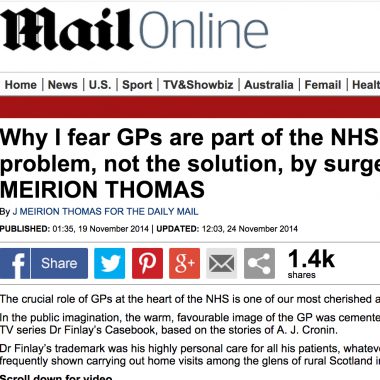More than half of GP trainees say they are being put of their chosen career due to ‘soul-destroying media coverage’ and ‘GP bashing’ in the press and by politicians.
Around 56% of the 178 trainees quizzed by researchers from Warwick Medical School said that the ‘current political and media comments about general practice have influenced my future career intentions…in a negative way’.
The same survey revealed that one-third of GP trainees said they were going to work in the NHS after training, echoing a Pulse survey earlier this month.
The researchers, who surveyed trainees nearing the end of training in the West Midlands, concluded: ‘The negative portrayal of general practice by politicians and the media was experienced as having had a detrimental effect on personal career intentions.’
Quotes from a number of GP trainees referred to GP bashing in the media.
What GPs trainees are saying
- ‘Constant GP bashing in media is demoralising, quite rare to hear stories about hard work and positive outcomes from primary care.’
- ‘There seems to be bad publicity about general practice from every angle. If you look in a newspaper you are told about ”bungling GPs”. The Government seems to think that we are not working at all and all crisis in hospital is due to our lack of work.
- ‘It all has led to a very negative atmosphere and makes me reluctant to go to work in the morning because I wonder what battle I am going to have to face that day.’
- ‘Media bashing of GP’s has affected morale combined with poor training on how to actually run a practice this has led to fear of applying for partnerships. Salaried doctors are used and abused by practices with no personal autonomy. Locum is the other option or emigrate. The tiered status within the profession needs to end.’
As Pulse reported earlier this month, many trainees said they wanted a portfolio career, combining the flexibility of locum or salaried positions, part-time work and other jobs such as CCG work and out-of-hours services.
Lead author Professor Jeremy Dale said: ‘General practice is experiencing a growing crisis, with the numbers of doctors who are training and then entering the profession in the UK failing to keep pace with workforce needs. With ever-increasing workload in general practice, there is an urgent need to understand and where possible address these issues at national and local level.’
RCGP chair Professor Helen Stokes-Lampard said the findings were ‘incredibly concerning – for the future of general practice, the wider NHS, and the care we’re able to deliver to our patients’.
She said that trainees were witnessing ‘the intense resource and workload pressures GPs and our teams are facing across the country’.
‘We really do need all the family doctors we can get – thousands more than we currently have, and of all types, be they partners, salaried or locum GPs – so the prospect of losing new GPs so early in their careers could be disastrous for the NHS.’
Pulse July survey
Take our July 2025 survey to potentially win £1.000 worth of tokens












